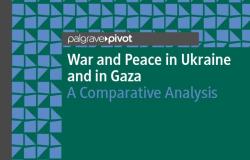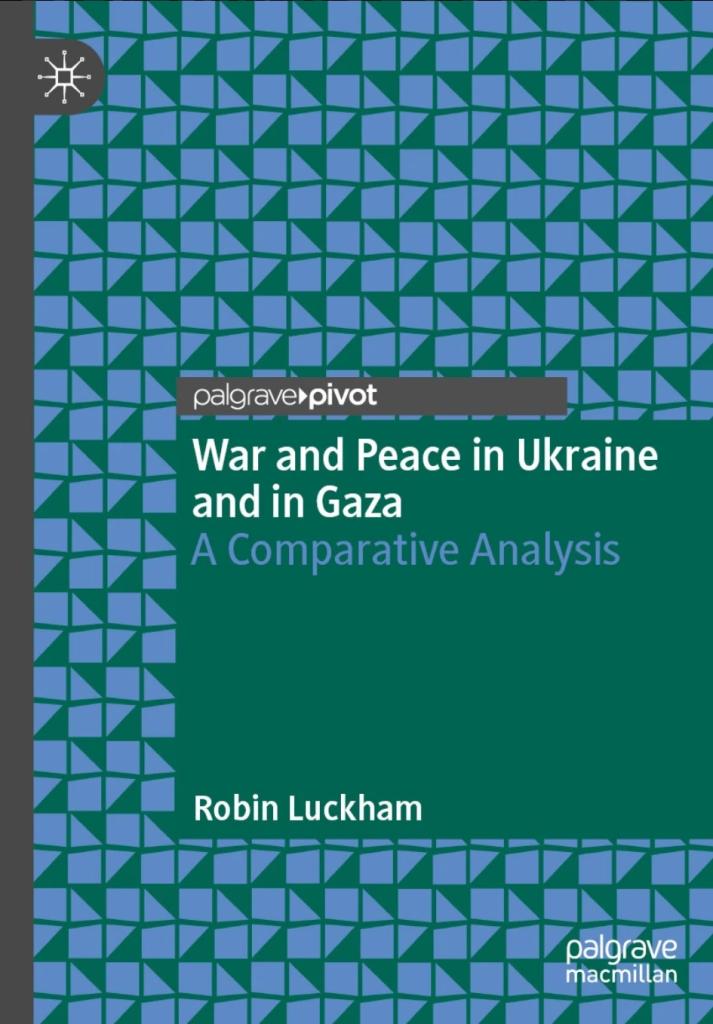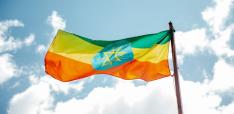Making War and Trumping Peace in Ukraine and in Gaza

Robin Luckham argues that the two wars belong within and reinforce wider transformations in the global order.
Russia’s invasion of Ukraine and even more Israel’s assault on Gaza have provoked massive humanitarian crises: destroying lives, wrecking productive infrastructure, and shattering institutions on an epic scale. The direct costs fall upon the people of Ukraine and the people of Palestine, especially Gaza, but also the West Bank. The indirect costs are spread more widely, especially in the global south, including big cuts in development and humanitarian assistance, the marginalisation of multilateral institutions and the diversion of priorities and resources from sustainable development and from tackling climate change.
 In my newly published book War and Peace in Ukraine and in Gaza. A Comparative Analysis (Palgrave 2025) I argue that the two wars belong within and reinforce wider transformations in the global order. They not only intertwine but also are comparable in significant respects. Both wars have deep historical roots in the disintegration of empires. Both are colonial wars in which powerful states are seizing territory, erasing the identities of subaltern nations and denying the rights of minorities. Both wars are propelled by rising tides of ethnonationalism, in each with an important religious dimension. Whilst Russia is an autocracy and Israel a democracy, in both countries the warmongers dominate the political agenda, with complex relationships between domestic power struggles and the goals and conduct of military operations. Both wars are the product of and reinforce broader global trends towards garrison states, in which security is the dominant consideration of state policy.
In my newly published book War and Peace in Ukraine and in Gaza. A Comparative Analysis (Palgrave 2025) I argue that the two wars belong within and reinforce wider transformations in the global order. They not only intertwine but also are comparable in significant respects. Both wars have deep historical roots in the disintegration of empires. Both are colonial wars in which powerful states are seizing territory, erasing the identities of subaltern nations and denying the rights of minorities. Both wars are propelled by rising tides of ethnonationalism, in each with an important religious dimension. Whilst Russia is an autocracy and Israel a democracy, in both countries the warmongers dominate the political agenda, with complex relationships between domestic power struggles and the goals and conduct of military operations. Both wars are the product of and reinforce broader global trends towards garrison states, in which security is the dominant consideration of state policy.
Both wars are unequal conflicts, in which large, well equipped military forces face armed resistance, in Ukraine’s case from a national army, in Gaza’s from armed militants. Both Russia and Israel have developed substantial arms economies and military-industrial complexes. President Putin and Prime Minister Netanyahu each seek a victor’s peace on their own terms and have shown little genuine interest so far in peace negotiations. The political and military leaders of Russia and of Israel – and of Hamas in Gaza – have been referred to the International Criminal Court and to the International Court of Justice for crimes against humanity and genocide. Yet in practice a dome of impunity protects powerful states. In neither conflict is there much hope of holding those responsible for war crimes, famine and destruction properly accountable.
There are of course differences. Russia is a fully fledged imperial state. Israel is a sub-imperial power, with tight military and economic ties to the United States. Israel is an occupying power in all the West Bank and Gaza. Russia occupies only part of Ukraine. New technologies, including drones, are reshaping both wars. Even so, Russia is still fighting a largely conventional military campaign against Ukraine; and Israel is waging a brutal counterinsurgency in Gaza.
Russia is an autocracy, in which the war has led to the closure of all remaining democratic spaces. Israel is a flawed, divided and violent democracy, but still a democracy, though it practices authoritarian governance in Palestinian occupied territories. Israel’s friends and supporters are in the West. Russia has drawn most its support from the East, especially China and North Korea, although it now seeks a strategic partnership with President Trump’s USA. Israel is a pariah in much of the global south; Russia is not, although the global south is divided over its invasion of Ukraine.
The advent to power of President Trump in the USA brings critical shifts, with major ramifications for Ukraine and for Gaza. In some respects, Trump’s crude reassertion of American power changes the entire global calculus, in others it merely accelerates existing trends, for instance towards rearmament, the decline of the development paradigm and the marginalisation of climate action. The immediate danger for Ukraine is that it will be forcibly dragged into an unjust and unstable peace with Russia. The danger for Gaza is that the ceasefires sought by the Trump administration will permit Israel to continuing its forever war and ethnic cleansing, not just in Gaza but also in the whole of Palestine.
The new world disorder that is emerging will surely be unstable and unforgiving. It will be more multipolar, but with power shared by an oligopoly of predatory superpowers. Multilateral institutions, including the UN and its agencies will be further weakened, perhaps irretrievably. The enfeebling of the UN along with the fragmentation of existing alliances will likely encourage nuclear proliferation. Military spending, already rising, will accelerate further, whilst resources are diverted from aid and welfare spending. Authoritarian governance will be consolidated where it already exists, and authoritarian practices of power will continue to grow within democracies, not least the USA. I fear, in sum, that negative peace, militarism, garrison states and underdevelopment will trump positive peace, disarmament, democratisation, and development.
Robin Luckham in an Emeritus Fellow at the Institute of Development Studies following six decades of research and teaching. He has published widely on the military and militarism in Africa and the global south, on poverty and violent conflict, and on security and development.


